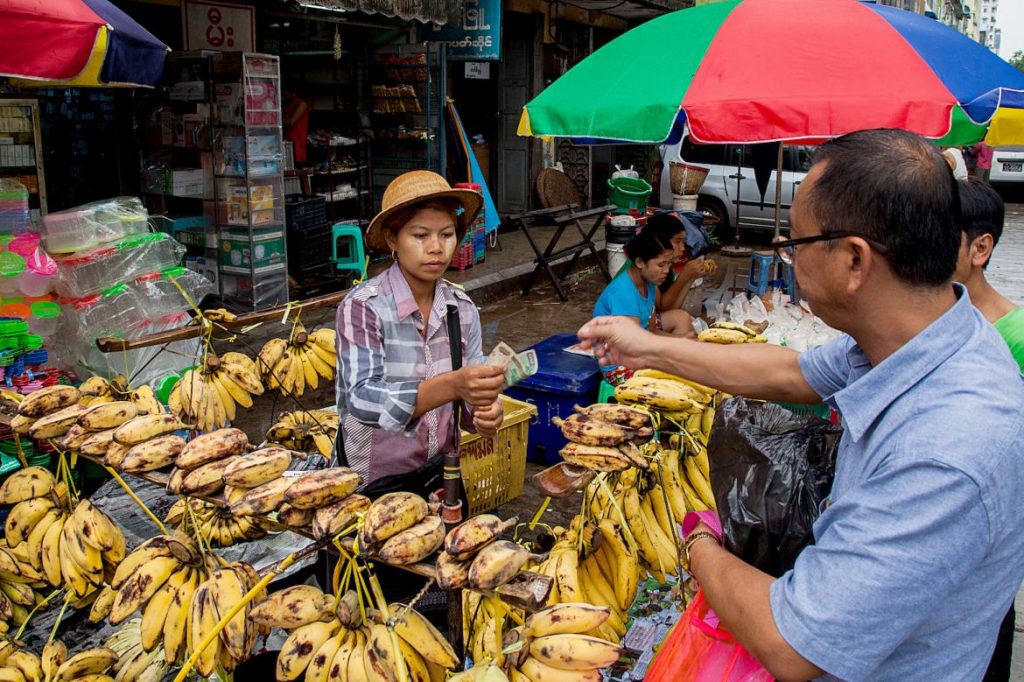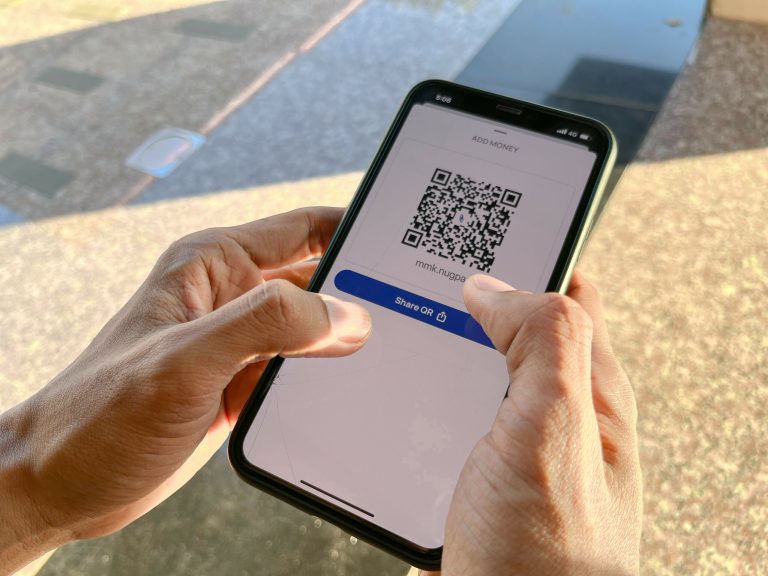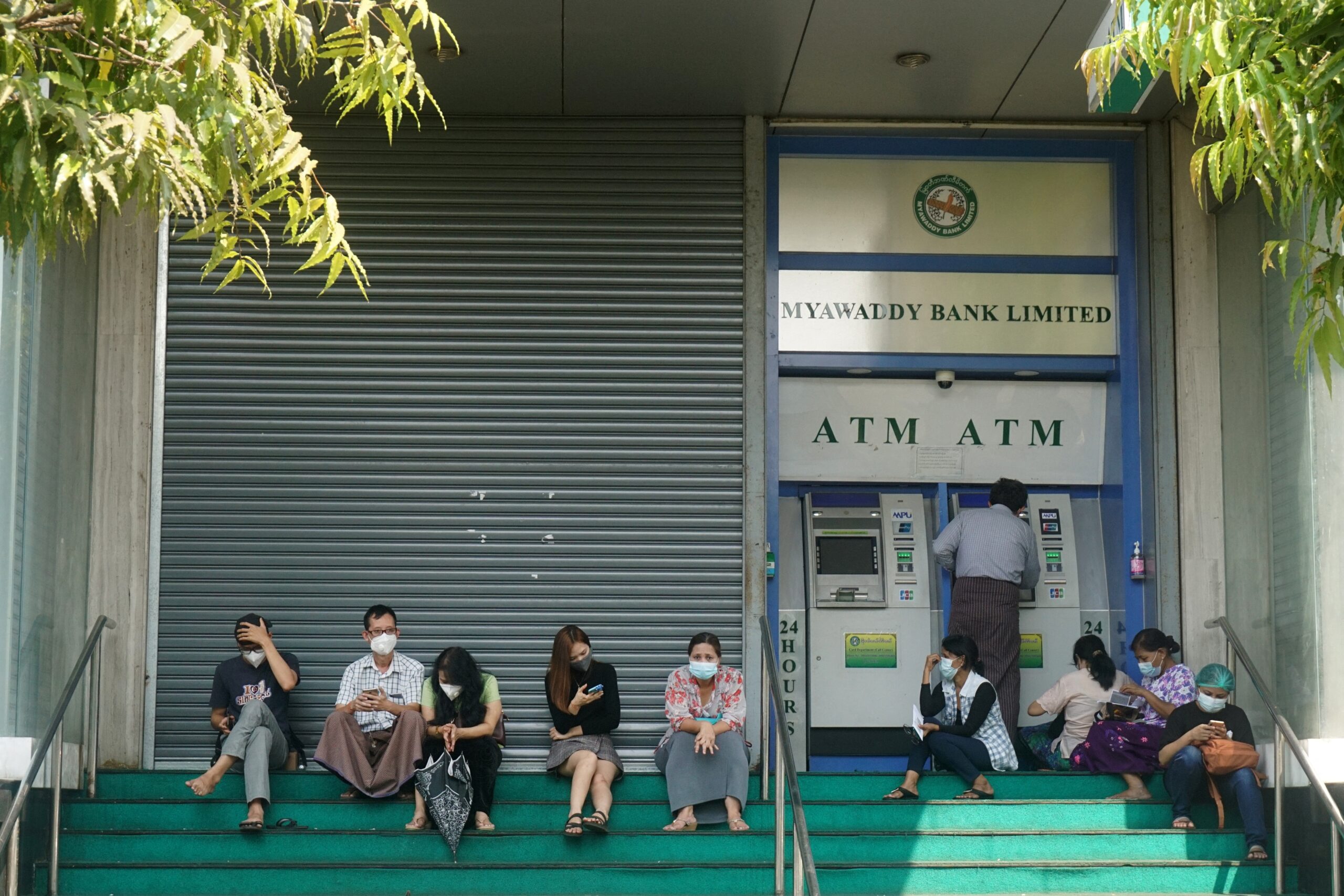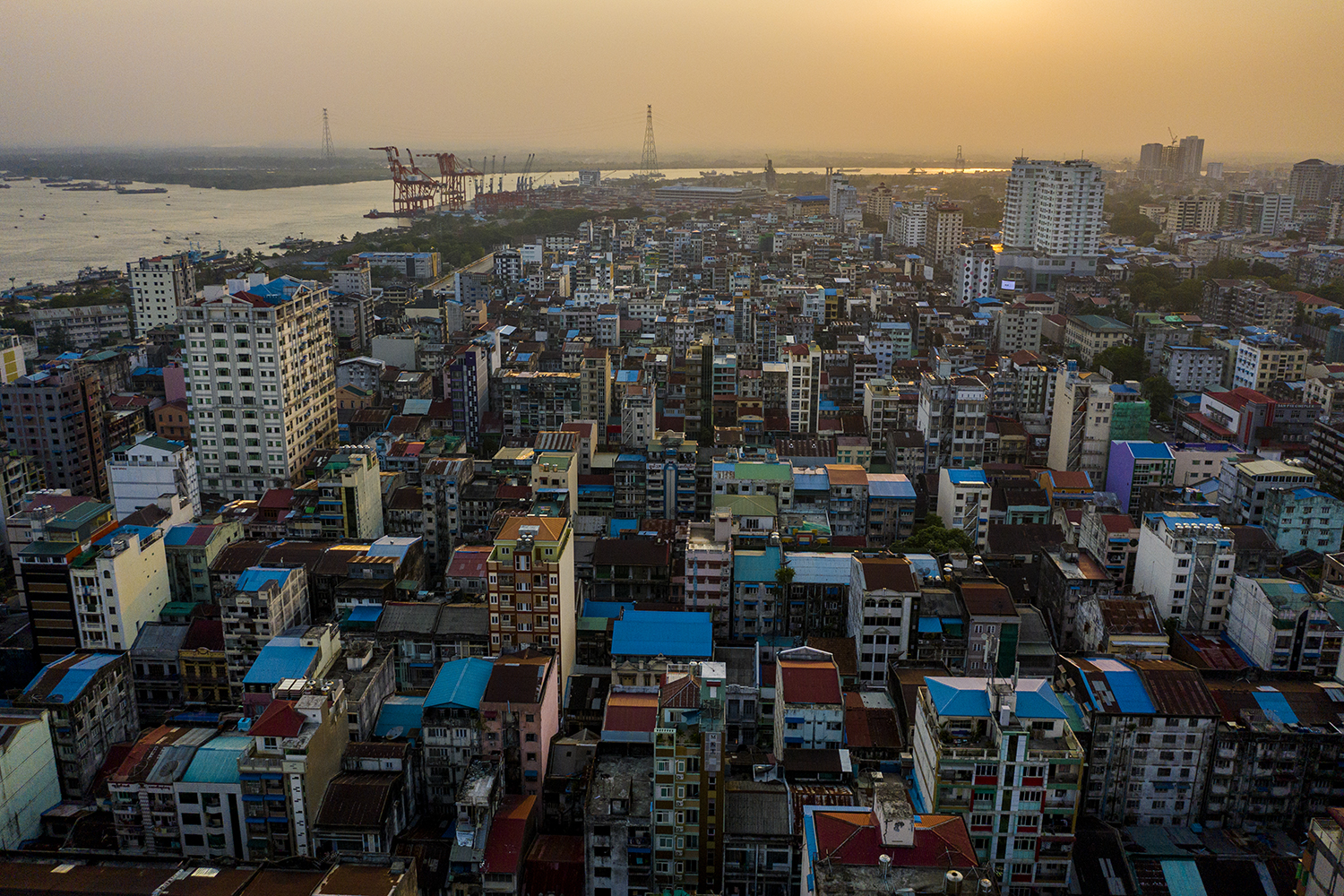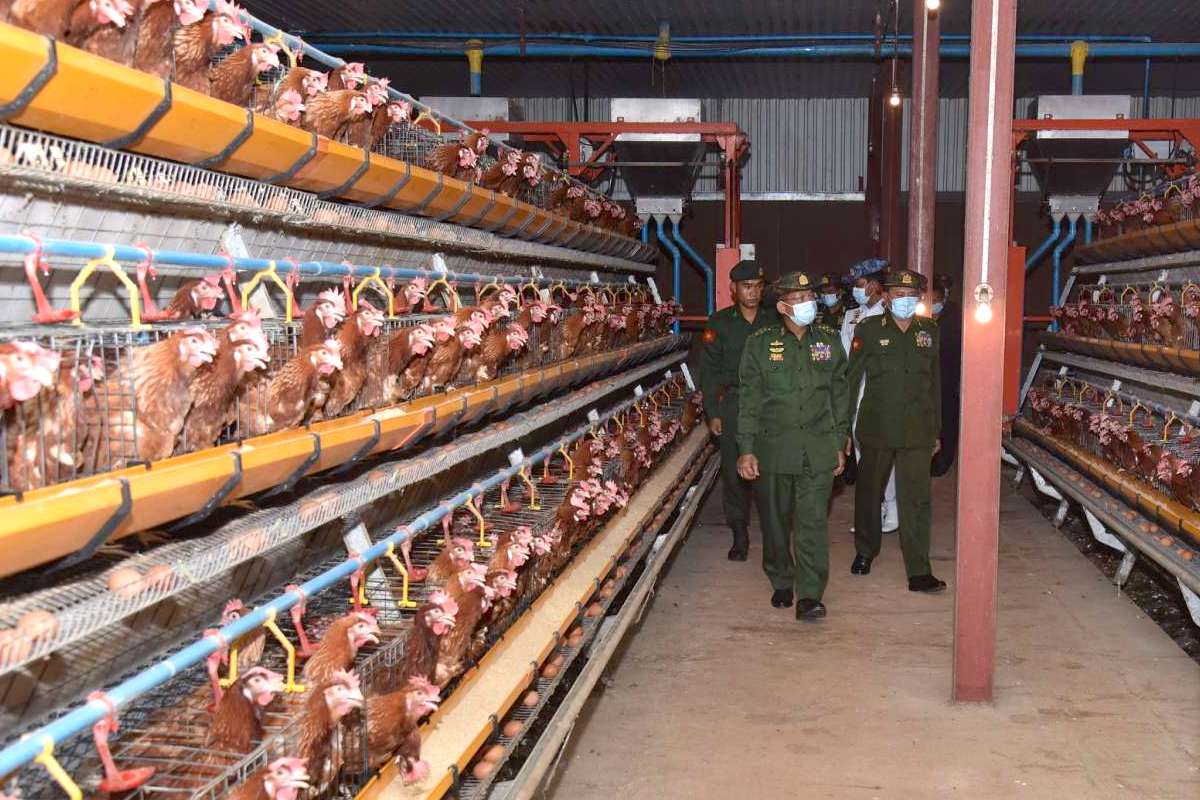By KYAW PHONE KYAW | FRONTIER
WAIT LONG enough in a bank, and you’ll see them arrive: teams of young men, with heavy plastic bags full of cash on their shoulders. Each bag contains the equivalent of tens of thousands of dollars – sometimes more than $100,000, depending on the denomination. Often, they’ll dump the piles of notes on the floor and count the individual blocks – each one a bundle of 100 notes – in front of waiting customers. And nobody will bat an eyelid.
Look more closely and you’ll also notice air purification machines dotted around the branch. These are to protect customers and staff from the dust and mould that inevitably builds up on such a large amount of cash. Bank staff also typically wear face masks to protect their respiratory systems from the particles in the air.
“The K1,000 notes are the dirtiest, because they are the most used in everyday transactions. But these days, even K5,000 notes are getting dirtier,” one bank teller told Frontier. “One of my colleagues had to be hospitalised to clear the dust from her lungs because of the long-term exposure to these dirty notes.”
But the scenes at the country’s 1,500 or so bank branches are not indicative of how most of the country saves its money.
Support more independent journalism like this. Sign up to be a Frontier member.
A village of almost 1,000 households, Oak Pon is just 80 kilometres (50 miles) from downtown Yangon. Farmer and former village administrator U Aung Kyi Nyunt, 71, said he is one of only two residents that have bank accounts. Most people save their money under the bed or in the cupboard. The nearest branch is 15km (9 miles) from the village, and Aung Kyi Nyunt said he hasn’t been there for more than a year.
When Frontier asked why other villagers don’t save their money in a bank, he replied with a laugh. “They have no money to save.”
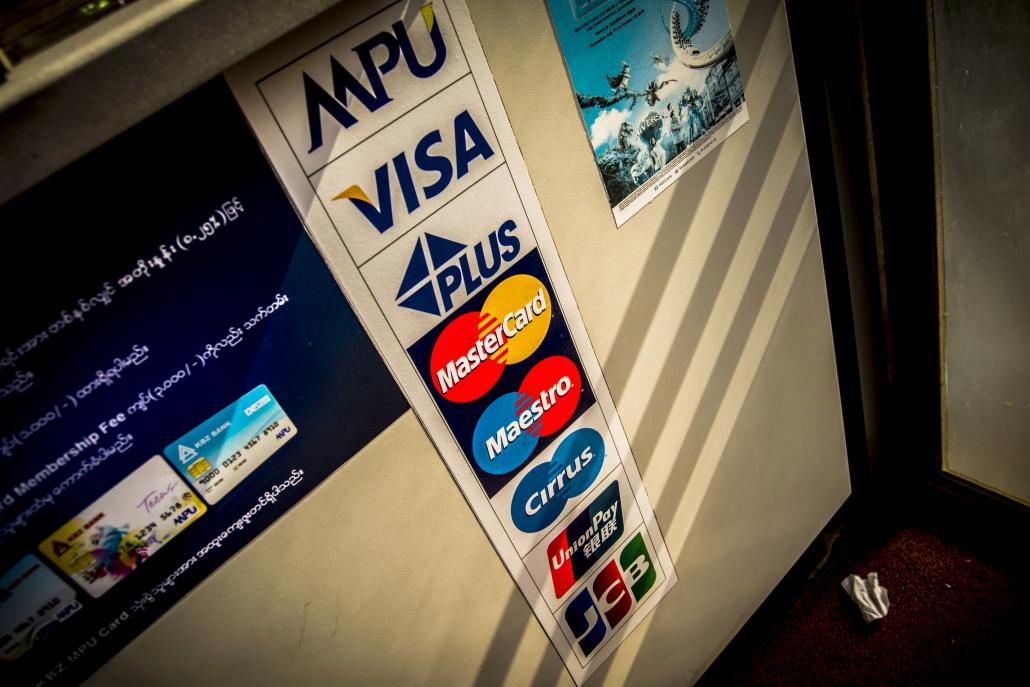
Myanmar Payment Union launched in 2011, and began issuing debit cards the following year. It now has around 1.8 million cards in circulation. (Maro Verli / Frontier)
According to World Bank statistics, this village is not an exception. The World Bank estimates less than 20 percent of the population uses formal financial services. New Crossroads Asia, a research firm, said its survey found that 37 percent of people who visited banks did not have an account and were only there to collect remittance transfers.
Wherever you look, cash is still very much king. Very few transactions take place using electronic transfers. Even large payments – the purchase of an apartment or car, for example – are still typically made in cash. Efforts to encourage electronic transfers have been only moderately successful, and in some examples failed completely.
Myanmar’s first ATM card was launched in 1995 by the privately owned Myanmar Mayflower Bank. Other private banks soon followed suit, but the use of debit and credit cards was suspended following the 2003 banking crisis. For the next eight years, the disused point-of-sale (POS) terminals and empty spaces where ATMs once stood at bank branches were the only reminders of this brief experiment with electronic transfers outside of bank branches.
In 2011, the Myanmar Payment Union (MPU) was formed with 23 banks on the instructions of the Central Bank of Myanmar. The next year ATMs were revived, with customers able to use their debit card at any MPU-affiliated ATM across the country.
According to MPU, 1.8 million cards are now in circulation. These can be used at around 1,500 ATM machines and 3,000 POS terminals across the country. In some cases, they can now also be used overseas, thanks to partnerships between MPU and two international card providers, Japan Credit Bureau (JCB) and UnionPay International (UPI) of China.
There are a number of payment cards issued by non-bank entities, such as iPay and Ok Dollar, though these are not widely used.
But these card-based systems have a lot of challenges to overcome. The first is trust.
Customers have frequently complained of ATM errors. The most common reported is that the ATM has not issued the funds requested but the amount has been debited from the account. Sometimes neither the card nor the money requested are released by the machine.
In other cases the ATMs simply run out of cash or are out of order, creating inconvenience for customers who need money urgently. As a result, many are still reluctant to rely on debit cards, preferring instead to carry cash.
These bad experiences – normally the result of power or telecommunications failures – are also often shared on social media, amplifying their effect.
On June 21, a Facebook user named Pan Thee wrote an account of an ATM error he had recently seen. In his post, he said he saw a woman using an ATM who had been unable to retrieve the money she requested. After she left, the money was released by the ATM, and was promptly taken by two bystanders. His Facebook post was shared 6,000 times in two days, and generated a large number of negative comments.
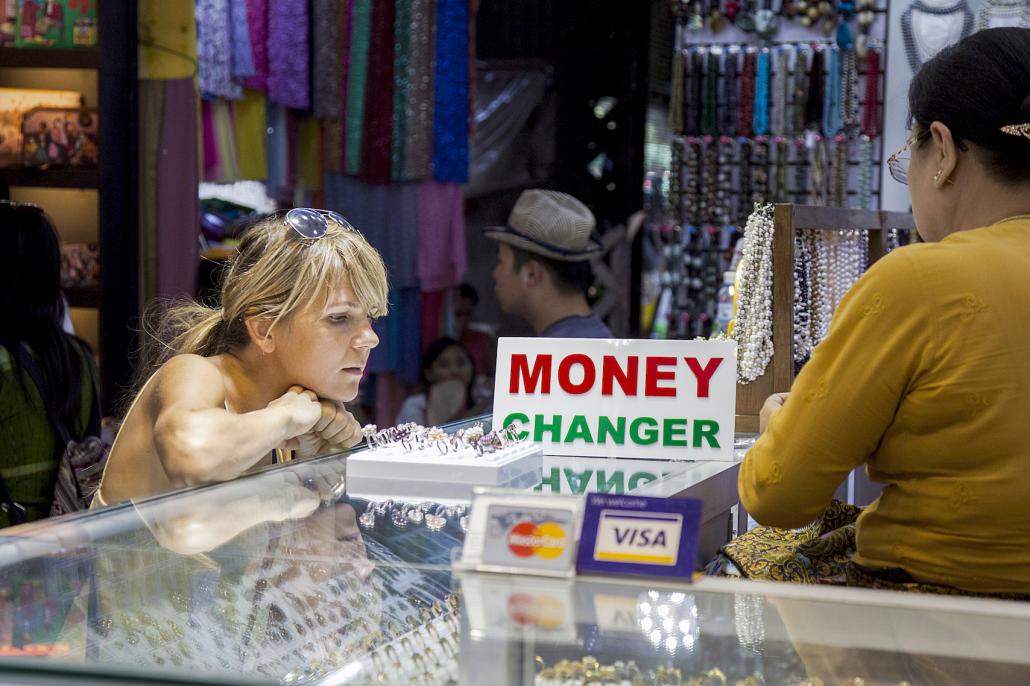
A tourist examines jewellery at a store in Bogyoke Market. (Theint Mon Soe / Frontier)
U Zaw Linn Htut, the CEO of MPU, said the problems with ATMs were an “infrastructure issue”.
“When the connection is stable, reliable and [offers wider] coverage, this will be solved. In addition, banks are acquiring new and modern technology to overcome their system errors,” he told Frontier.
One way in which banks are responding is by providing their own network connection. In June, KBZ Gateway launched a satellite internet service that could be used to provide a steady connection to branches, ATMs and POS terminals around the country.
But while electronic transfers might be occasionally costly to the consumer, a cash-based system places burdens on the broader economy, said U San Thein, a senior national expert on financial sector development at GIZ Myanmar, a German government organisation focused on international development.
“The cash-based economic system creates unnecessary losses in terms of time and transaction fees. Even printing money to replace old notes – which get old because they are being counted repeatedly – is a financial burden for the Central Bank,” he said.
Reduced use of cash and more deposits in banks would also make it easier for the government to manage monetary policy, he added.
“Myanmar needs to move toward a cashless financial system but it has a lot of barriers to overcome first.”
Reforms are underway to improve confidence in cashless banking, which is struggling to recover from the effects of the 2003 crisis.
One change came in January, with the enactment of a new Financial Institutions Law to replace the outdated 1990 law. It contains sections related to digital banking and some analysts told Frontier the law would serve as a new platform for the financial sector to push electronic transactions. In March, the central bank followed this up with the Mobile Financial Services regulation.
Changes are already apparent. Some private banks recently started issuing credit cards for the first time in more than a decade, even though Myanmar still does not have a credit bureau.
The rapid growth of smartphones – mobile phone penetration is estimated to have hit 75 percent, with around 40 million subscribers – also offers the potential for banking services to be offered outside the branch. Some banks already allow mobile transactions between accounts within the same bank.
Dr Hla Nyunt, deputy managing director of Global Treasure Bank, said he believed mobile-based banking was likely to overtake use of bricks-and-mortar branches fairly quickly.
But he also warned that introduction of new mobile-based services would need to be accompanied by financial literacy education programs.
He said transition to electronic payments would be a slow process, but some progress should be visible within five years.
Zaw Linn Htut from MPU said there were huge obstacles to overcome to transition to a “cashless society”. He noted that neighbouring countries had been using debit and credit cards for more than 20 years but still relied to some extent on cash.
One of the chief challenges is infrastructure. Many areas still lack reliable telecommunications network coverage. Just one-third of households are on the national power grid.
But education is also essential, Zaw Linn Htut said. “We can leapfrog to modern technology but we need the skillsets to implement it and training to utilise it,” he said. “Media campaigns are needed to let people know about the benefits of using cards and electronic payments.”
He called on the government to introduce tax incentives to encourage merchants to accept card payments for goods and services. He said this would have a range of benefits, including easier monitoring of money circulation and improved tax collection.
“We need to develop and create our payment culture through digital channels that are more secure, convenient and easy to use in daily life,” he said.
When Frontier asked Aung Kyi Nyunt, the elderly farmer, if he thought he would one day be able to use a debit card to withdraw money from an ATM or buy products, rather than use cash, he was initially confused. “I have never heard the word ‘ATM’ before,” he said. “You’re the first person I’ve heard say it.”
This article originally appeared in Frontier Myanmar’s Banking and Finance special edition, published in July 2016.


